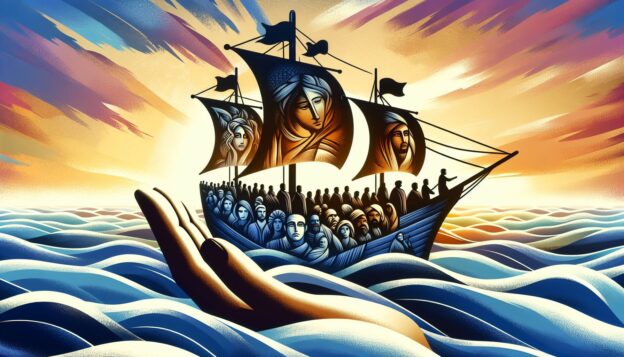In the bustling corridors of our nation’s politics, the clamor of conflicting ideas often drowns out the steadfast truths upon which America was founded. A strong nation—not just economically or militarily but also morally—requires a foundation that transcends the fickle waves of contemporary trends. This unwavering bedrock is none other than our Judeo-Christian heritage, a heritage that seems to be under siege in today’s culture.
Now, more than ever, preserving the role of faith in the public square is not just about tradition, but about safeguarding the very essence of what it means to be an American. Our founding fathers recognized the significance of faith as the compass for a society navigating the seas of democracy and human governance. They understood that without a moral roadmap, freedom becomes directionless, leading a nation through an odyssey of moral relativism and, eventually, decline.
The undeniable impact of faith-led individuals throughout our history provides ample evidence of faith’s instrumental role. Take, for example, the influence of William Wilberforce, a devoutly Christian Englishman, whose tireless efforts led to the abolition of the slave trade in the British Empire. His American counterparts, driven by their faith, laid the foundation for the abolitionist movement that culminated in the Emancipation Proclamation. The civil rights movement, under the leadership of Reverend Martin Luther King Jr., was galvanized by this same religious conviction, echoing the biblical sentiment that all men are created equal.
Moving to contemporary issues, the sanctity of life remains at the forefront of the conservative cause. The scriptures affirm that every human life, from conception to natural death, is precious and created in the image of God. In an era when life is often measured by convenience or economic worth, we must stand firm on the intrinsic value that our Creator has imbued in every individual.
Furthermore, the institution of marriage and the family unit, which are cornerstone elements of a healthy society, have been subject to a distressing redefinition. The blueprint for a strong family, as outlined in the Bible, has been the guiding construction plan for the societal structure that has weathered the storms of history. The erosion of these values corresponds to an increase in social instability and a myriad of woes that follow in the wake of broken homes and fragmented communities.
Also, throughout our nation’s history, religious liberty has been a bastion of freedom, allowing individuals to live according to their deepest convictions. As conservatism stands in defense of these liberties, we are reminded of men who embodied this principle—men like President Ronald Reagan who, amidst the pressures of political cynicism, remained unabashed about his belief in a Providential hand guiding America’s destiny. His unapologetic stance on the role of faith in public life invigorated a nation and tore down the ominous shadow of communism.
In discussions of economic policy, the conservative appraisal of free markets finds kinship with the biblical admonition for individuals to be diligent and responsible. Hard work and personal responsibility are not just societal expectations; they are moral imperatives. Yet, in a bizarre reversal, there are calls from certain quarters to replace the tried-and-true work ethic with a government-dependent culture, stripping individuals of their God-given dignity that comes from fruitful labor.
The strength of education—a pillar for any advancing civilization—can also be traced back to the religious institutions that first established the renowned universities of our present day. These institutions were originally nurtured by a desire for learning that stemmed from a reverence for knowledge and truth, gifts from our Creator. The present-day solution to our educational dilemmas does not lie in erasing our religious history but in embracing it.
As we consider the role of faith in contemporary politics and culture, let us remember that it is not a boundary that confines us but a light that guides us. It offers the wisdom to discern justice, the ethos for civic engagement, and the motivation for benevolence to our fellow man. But this light is threatened to be extinguished by the blustering winds of secular movements that seek to revamp society devoid of divine reference.
It is essential, then, to lift our voices, to shine against the prevailing darkness, to exemplify through our lives and actions the enduring legacy that our faith imparts. Let us engage in our civic duties with a prayer on our lips, a biblical truth in our minds, and a fervent love for our neighbors in our hearts. We must strive to pass on to the next generation not only a nation of wealth and power but one rich in the moral and spiritual truths that are the true metrics of progress and prosperity.
With each tick of the clock, the pages of history turn, awaiting the imprint of our choices. Will we be a people who squander our inheritance for a hollow promise of progress? Or will we be the guardians of a legacy that has weathered the tumult of the centuries, grounded in the eternal truth that has set us free indeed?
We have witnessed the grand tapestry of America woven with threads of faith and fortitude. Let us not now unravel this great work. In standing for conservative values rooted in our Christian faith, we honor those who have come before us and provide a beacon of hope to those who will follow. Our charge is clear—let us protect and perpetuate the values that have and will secure the blessings of liberty for ourselves and the posterity.
